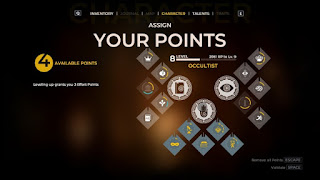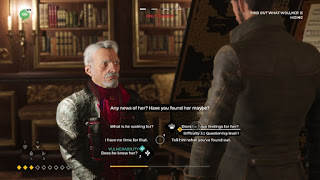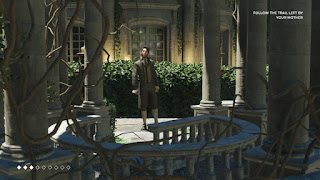Dark Game Review: The Council (PC)
Recent years have
brought gamers some fantastic episodic adventure games, but for me
Big Bad Wolf’s The Council has to be the darkest I’ve
encountered, both in the characters’ deeds, and in the game’s
aesthetics. I’m a big fan of Dennis Wheatley, particularly his Duke
de Richleau character, the intelligent occultist gentleman who always
has some piece of arcane knowledge that will get the characters out
of trouble. The Council felt very “de Richleauian” to me,
and about half an hour into the story, I knew that I felt at home.
The player character is
Louis de Richet, a young man who in 1793, is invited to the island of
Lord Mortimer, a powerful and mysterious figure who seems to know
pretty much everyone mighty and powerful. Louis’ mother is also on
the island, but she has gone missing, with no one knowing where she
is. Both she and her son are members of a secret society, a society
that wields its own power across the world. As Louis, you must find
out what happened to your mother, deal with the intrigues of your
host and his powerful guests, and also grow as a person in your
knowledge and abilities.
 The Council is a
third person narrative adventure game. As you walk around Lord
Mortimer’s island, you can interact with the characters and various
other objects in a number of ways. When speaking to a character, you
will often see a variety of conversation options to choose from. Some
won’t be available to you, because Louis might be lacking the
ability to use them at that time. As you complete tasks in the game,
and collect various manuscripts, you can boost Louis’ abilities in
a number of areas, from occult knowledge, to detective abilities such
as logic and agility. If you have enough Effort Points and the
correct ability unlocked, you can use that particular tactic during
the conversation.
The Council is a
third person narrative adventure game. As you walk around Lord
Mortimer’s island, you can interact with the characters and various
other objects in a number of ways. When speaking to a character, you
will often see a variety of conversation options to choose from. Some
won’t be available to you, because Louis might be lacking the
ability to use them at that time. As you complete tasks in the game,
and collect various manuscripts, you can boost Louis’ abilities in
a number of areas, from occult knowledge, to detective abilities such
as logic and agility. If you have enough Effort Points and the
correct ability unlocked, you can use that particular tactic during
the conversation.
There are a variety of
items to collect in the game world, from the hard to see collector’s
coins, to useful potions that restore Effort Points or highlight
other things, such as someone’s vulnerabilities for a short time.
Getting information out of your conversational partners, and their
trust, is key to achieving your aims in The Council, so
anything that boosts your abilities in this area is a welcome thing.
Even with the variety and number of pick-ups, things are still scarce
enough to mean that you will likely have some conversations the old
fashioned way, that is, without extra help. If you overuse certain
potions or make a blunder, your character can be hindered by a
de-buff that makes certain actions more costly. But hey, wouldn’t
you know it, finding and drinking some Golden Elixir will remove any
negative status effects, so things are golden in more ways than one.
The conversations are
where The Council truly shines. Each character has their own
personality, complete with vulnerabilities and immunities to
particular manners of approach. Trying to manipulate someone who is
immune to manipulation isn’t going to end well. Conversations are
used to probe and test, the dancing around the subject at hand just
as valuable as finding out what that character knows. There are times
when you will have to lie, others where brutal, risky honesty might
win the day. Slapping Napoleon Bonaparte to end a risky “what are
you doing?” conversation chain is just one of the ways that you can
deal with the challenges Louis faces. As the description on the
game’s Steam Store page says, failing an encounter isn’t game
over, but it will have consequences later.
 As the characters are
so central to The Council, it is no surprise to see that they
are presented in
As the characters are
so central to The Council, it is no surprise to see that they
are presented in lovely detail, particularly their faces. I must admit that Duchess Emily Hillsborrow was my absolute favourite because she was dark, sarcastic, and seemed to channel Eva Green, both in look and attitude. Her particular elements of the main story were some of the most interesting too, a couple of “reveals” genuinely twisting things to a new level. All of the characters were fun though, out for themselves, scheming and duplicitous. The location too, a grand mansion with room after room of obscure relics, mystical artwork and books of knowledge, was a pleasure to explore. The blue-sky view from the guest room was a particular highlight, and later, the hidden places that aren’t visible unless you know their secret entrances.
The
game gives Louis a fair few environmental puzzles to solve, from
decoding the cryptic clues needed to open a combination lock, to
using books and artwork to deduce how to find a rare artefact. The
puzzles were for the most part very enjoyable. I did get stuck on a
couple of them, but given enough time I was able to get to the bottom
of things. This proved very satisfying, as the game made me feel like
I had actually earned my progression. A couple of puzzles near the
end of the game were a bit tedious however, but still relatively fun.
I must admit that the game certainly gets great mileage out of its
mansion location, but traversing the corridors and various rooms
never seems to take too long, which is a fine balance to achieve.
My first play-through
of The Council lasted around 12 hours, and the ending I
achieved was so dark that I couldn’t help but smile. Before
playing, I had seen a number of people say that they loved the game
until the final episode or two, when things slipped a little. For my
play-through, I don’t really recognise this. The story is layered,
and as you play and reveal more and more of what is going on, the
things you previously thought you understood sometimes shift, or
sometimes solidify. I didn’t feel the rug was pulled out from under
me, nor was I confused about what was going on. The only reason I can
see for the comments of the people who didn’t like the way it went
is that it somehow confounded their expectations of what the game
would be like. Go into The Council with occult-detective in
mind and I don’t think you'll be disappointed. I wasn’t.
I really want to play
The Council again, taking the other options that I either
messed up or ignored the first time. This is
also something that is very rare for me, as when it comes to “your
decisions have consequences” narrative games, I nearly always only
play once, get my own version of the story, and move on. This is
mainly because I like feeling that my outcome happened, and replaying
over and over to get “all the endings” just lessens the impact of
that first enjoyable jaunt through the game.
The Council has planted the urge in me to learn more about its world and characters, and to try and “better” the first ending I got. There is something about its dark mansion, masked servants and conversational combat that is trying to drag me straight back in, and I know it is a call I will answer soon. That being said, I am reasonably sure that my next attempt at the game will be my last, as thinking ahead with the knowledge I already have, the amount of repetition in a third play-through would be too tedious for me to fancy. Still, two journeys through the story will likely equal around 20 hours of play time, in a game world with characters I enjoy interacting with, so I’m more than happy enough with that.
The Council has planted the urge in me to learn more about its world and characters, and to try and “better” the first ending I got. There is something about its dark mansion, masked servants and conversational combat that is trying to drag me straight back in, and I know it is a call I will answer soon. That being said, I am reasonably sure that my next attempt at the game will be my last, as thinking ahead with the knowledge I already have, the amount of repetition in a third play-through would be too tedious for me to fancy. Still, two journeys through the story will likely equal around 20 hours of play time, in a game world with characters I enjoy interacting with, so I’m more than happy enough with that.
If you know that you
enjoy the Telltale or Life is Strange episodic adventure
variety of game, but fancy something more layered, dark and
RPG-esque, I highly recommend that you pick up The Council.
Game Title: The
Council
Developer: Big
Bad Wolf
Publisher: Focus
Home Interactive
RRP: £25.99 (on
Steam)
Available on: PC,
Xbox One and PS4.
PEGI Rating:
16+




